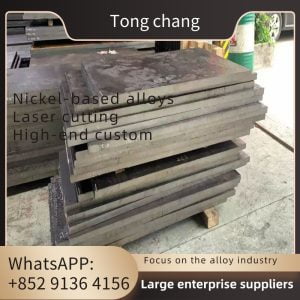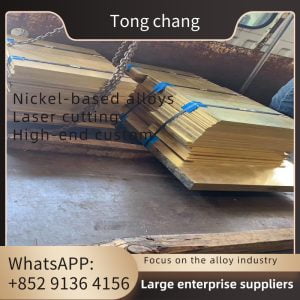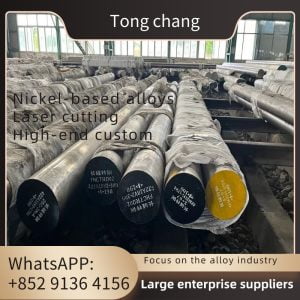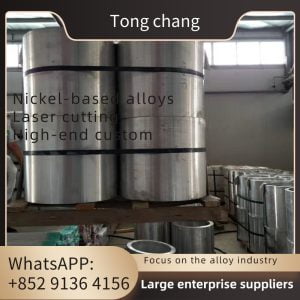| Product Name: | Nickel Alloy | Specification: | ASTM B407 |
|---|---|---|---|
| Material: | UNS N08810/Incoloy 800H | Technique: | Cold Drawn/Cold Finished |
| Shape: | Round | Application: | Marine & Offshore, Oil And Gas,boiler,heat Exchanger,handrail |
| High Light: | NIckel Alloy Pipe UNS N08810, Incoloy 800H NIckel Alloy, Cold Finished NIckel Alloy | ||
ASTM B407 UNS N08810/Incoloy 800H/DIN 1.4958 Nickel Alloy
Whats is Alloy 800H?
Alloy 800H is a high-temperature resistant alloy that is commonly used in applications requiring excellent resistance to oxidation, carburization, and other forms of high-temperature corrosion. Alloy 800H is a type of pipe made from this alloy using a seamless manufacturing process.
The Incoloy 800H Pipe is a type of pipe made from a nickel-chromium alloy, which belongs to the 800 series alloy family. It shares similar characteristics with other pipes in this alloy series. One of the key features of the Incoloy 800H Pipe is its ability to withstand prolonged exposure to elevated temperatures, oxidation, sulfidation, and carburization. It also exhibits excellent resistance to high-temperature corrosion. By adding carbon and subjecting the Alloy 800H Pipe to annealing treatment, its creep and rupture properties are further improved at temperatures above 600 degrees C. The ASTM B407 UNS N08810 material used in this pipe has high machinability and can be easily machined using standard procedures. The pipe is best welded using products that can withstand high-temperature conditions. Furthermore, the Inconel 800H is known for its resistance to corrosion in aqueous environments at moderate temperatures.
Here are some key features and characteristics of Alloy 800H:
1. High-temperature resistance: Alloy 800H can withstand elevated temperatures up to 1100°C (2010°F) while maintaining its mechanical properties. This makes it suitable for applications in industries such as chemical processing, heat treating, and power generation.
2. Corrosion resistance: This alloy offers excellent resistance to carburization, oxidation, and other corrosive environments, including sulfur-containing atmospheres. It is often used in environments containing acids, alkalis, and gases.
3. Good mechanical properties: Alloy 800H has high tensile strength and excellent creep rupture properties at high temperatures, allowing it to withstand thermal stress and mechanical loads.
4. Chemical composition: Alloy 800H is a modification of the original Alloy 800 with increased carbon content, which improves its high-temperature characteristics. The composition includes nickel, chromium, iron, and small amounts of other elements.
5. Seamless manufacturing process: manufacturing involves extruding a solid billet of alloy material through a piercing rod to form a hollow pipe without any welded joints. This results in a pipe with consistent dimensions, improved surface finish, and enhanced mechanical properties.
6. Versatility: Alloy 800H is used in various industries, including chemical processing, petrochemical, power generation, and heat exchangers. It is suitable for applications such as furnaces, boilers, heat exchangers, and piping systems.
Overall, Alloy 800H provides exceptional high-temperature performance, corrosion resistance, and mechanical properties, making it a reliable choice for applications requiring these qualities.
Incoloy 800H Tube Chemical Composition
| GRADE | Ni | C | Fe | Si | Mn | S | Al | Ti | Cu | Cr |
| Incoloy 800H | 30-35 | 0.05-0.1 | 39.5 min | 1.0 max | 1.5 max | 0.015 max | 0.15-0.60 | 0.15-0.60 | 0.75 max | 19-23 |
Mechanical Properties Of Alloy 800H Tube
| Density | Melting Point | Yield Strength (0.2%Offset) | Tensile Strength | Elongation |
| 7.94 g/cm3 | 1385 °C (2525 °F) | Psi – 30,000 , MPa – 205 | Psi – 75,000 , MPa -520 | 30 % |
Incoloy 800H Tubing Equivalent
| STANDARD | UNS | WERKSTOFF NR. | AFNOR | EN | JIS | BS | GOST | OR |
| Incoloy 800H | N08810 | 1.4958 | Z8NC32-21 | X10NiCrAlTi32-20 | NCF 800H | NA 15(H) | ЭИ670 | XH32T |
Application of Incoloy 800H:
-Ethylene furnace quench boilers
-Hydrocarbon cracking
-Valves, fittings and other components exposed to corrosive attack from 1100-1800° F
-Industrial furnaces
-Heat-treating equipment
-Chemical and petrochemical processing
-Super-heater and re-heaters in power plants
-Pressure vessels
-Heat exchangers






